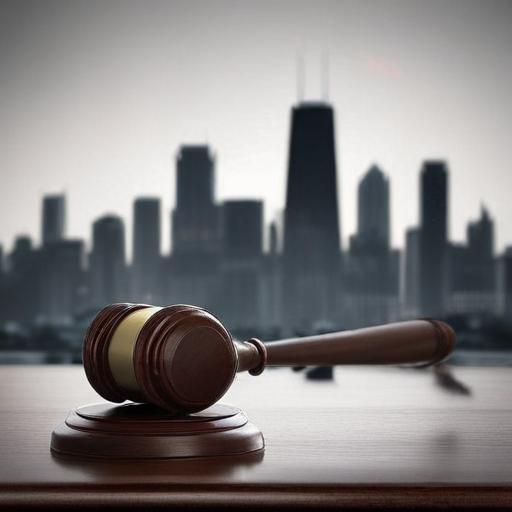Trump signals Chicago could be next focus of federal crackdown
President Donald Trump said on Friday that Chicago is likely to be the next city in his broader push to crack down on crime, homelessness and illegal immigration, hinting at a similar approach to what he has pursued in Washington, D.C., where about 2,000 troops have been deployed on the streets. “I think Chicago will be our next,” Trump told reporters at the White House, adding, “And then we’ll help with New York.” The remarks came as the Pentagon began ordering troops in Washington to carry firearms, though there have been no indications they have faced direct threats requiring weapons.
Trump has frequently described some of the nation’s largest cities—Democratic-ruled with Black mayors and majority-minority populations—as dangerous and unclean. He singled out Chicago on Friday, calling it a “mess” and saying residents there are “screaming for us to come” despite notable declines in violence in recent years.
Chicago’s response to the idea of a federal crackdown in the city was swift and critical. Mayor Brandon Johnson said his office had not received formal communication about military or federal law enforcement deployments but voiced grave concerns about the “unlawful deployment of National Guard troops.” He condemned Trump’s approach as “uncoordinated, uncalled for, and unsound,” warning that it could inflame tensions between residents and law enforcement. He also noted the legal uncertainty around applying a D.C.-style strategy in Chicago, where home-rule protections limit federal authority.
Trump’s eldest son, Donald Trump Jr., floated the possibility of expanding the lineup of cities under scrutiny in an interview with Newsmax, suggesting Portland and Seattle might be next, and deriding Democratic-led cities as “craphole cities” responsible for rising murder rates.
In a separate online post, Gov. JB Pritzker, a Democrat, ridiculed Trump’s approach as an “authoritarian power grab” and emphasized that what Chicago residents are asking for is not a federal takeover but practical, bipartisan solutions to crime and violence.
Senators and local Democrats pushed back. U.S. Sen. Dick Durbin called Trump’s Washington, D.C. strategy “political theater,” arguing for “proven bipartisan solutions” to reduce crime. Sen. Tammy Duckworth criticized Trump’s use of the military as intimidation in American communities. Lisa Hernandez, chair of the Democratic Party of Illinois, labeled Trump’s rhetoric offensive and noted that Chicagoans are not begging for federal intervention.
The city has long faced violent crime challenges. Chicago data show substantial improvements in the first half of 2025, with shootings and homicides down more than 30% from the same period in 2024, and total violent crime down more than 22%. Mayor Johnson highlighted Chicago’s investments in housing, mental health services, community-based interventions and higher minimum wages as part of a broader strategy to reduce violence. He urged a reversal of the $158 million cut he says Trump-levels of funding had targeted for violence-prevention programs.
Community advocates stressed that lasting reductions in gun violence require community-based efforts rather than militarized responses. Pastor Donovan Price, who works with gun-violence victims, argued that the path forward lies in locally led programs that address root causes, not federal deployments.
What this could mean for Chicago going forward remains unclear. The city’s leaders emphasize that genuine safety comes from investments in housing, education and health services, while federal officials have yet to outline concrete plans or timelines for any potential deployment in Chicago.
Commentary and analysis
– The clash highlights the continuing debate over the role of federal intervention in urban crime reductions, especially in cities governed by Democratic administrations.
– Chicago’s crime trends in the first half of 2025 suggest progress, but officials stress that sustainable safety requires comprehensive community strategies and sustained funding for prevention and support services.
– If federal actions were to be considered in Chicago, authorities would face complex legal questions about home-rule protections and civil rights considerations, alongside practical questions about coordinating with city agencies.
Summary
Trump signaled that Chicago could become the next focal point of a federal crackdown on crime, echoing actions taken in Washington, D.C. City leaders and national lawmakers responded with skepticism and concern about legality, implementation, and the potential impact on community relations. Chicago continues to pursue its own crime-reduction strategy, highlighting investments in housing, mental health, education and community-based programs as a path to safer neighborhoods.
Additional context and possible angles for follow-up
– Explore the legal framework of home rule in Chicago versus federal authority seen in D.C.
– Track changes in crime prevention funding and the status of violence-prevention programs in Illinois cities.
– Monitor community organizations’ responses to any proposed federal presence and how residents perceive safety initiatives over time.
– Consider profiles of neighborhoods most affected by gun violence and the local programs showing measurable impact.
Overall tone: This piece presents a balanced view of Trump’s remarks, the city’s stated responses, and the broader policy debate around federal involvement in urban crime, with attention to both the potential risks and the constructive approaches highlighted by local leaders.
